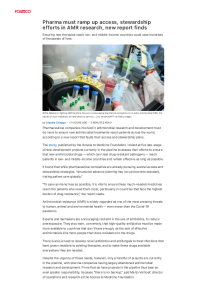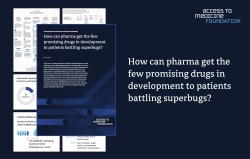Date
23 May 2024
Pharma must ramp up access, stewardship efforts in AMR research, new report finds
The article explains the two-pronged problem of AMR: the need to address the overuse of antimicrobial drugs, which is a major contributor to the rise of drug-resistant pathogens, while increasing availability of certain antimicrobials in low- and middle-income countries where access to these critical, life-saving medications is lacking.
It also highlights the need to create new antimicrobial products as drug-resistant superbugs become more prominent – an effort which is being sidelined by large research-based pharmaceuticals companies.
“Especially because the pipeline is … so empty, there’s even more pressure on the few companies that are still developing these novel antibiotics or novel antifungals to reach everybody across the globe,” Marijn told POLITICO.
In addition to noting the need to invest in research and development of new drugs, the article also relays a key takeaway from the report: that better access planning for products that are already in the pipeline can save lives.
“When we look at the big pharmaceutical companies like GSK and Pfizer, which we highlight in the report, we didnʼt see plans that were really detailed, which is what we kind of expect from these companies because they have all their resources, all the means to do so,” Marijn told POLITICO. “So we were expecting a bit more details from that end.”
Additionally, it notes the importance of partnerships between big and small pharma companies. “That really needs to change,” Marijn said. “We cannot depend on organisations like GARDP to take responsibility in low- and middle-income countries. We need companies, big companies, to step up.”

